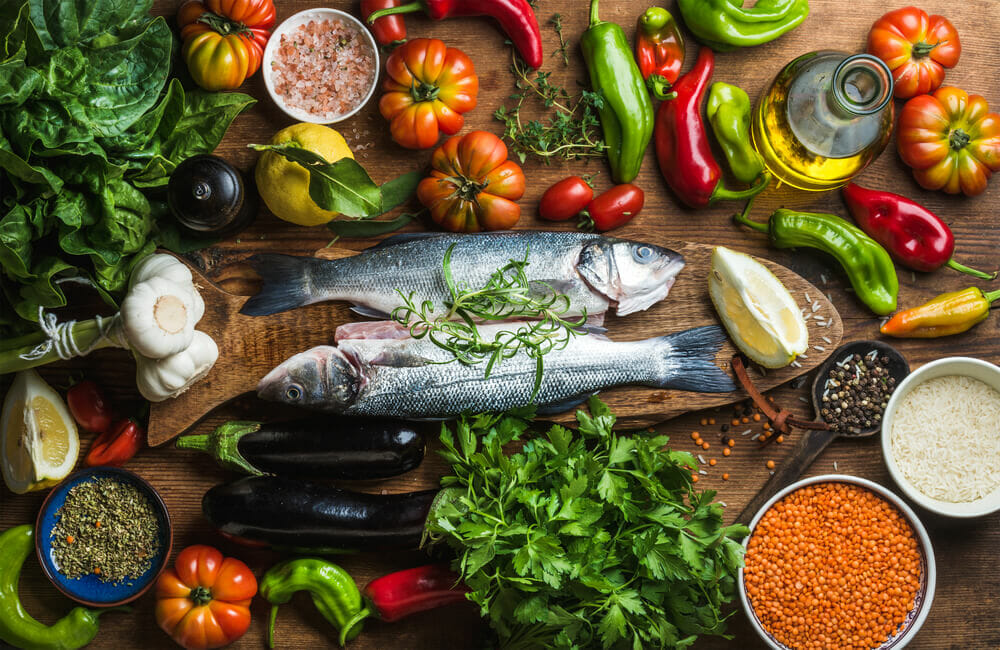
The word ‘diet’ is often met with a bit of trepidation; it often focuses on what you can’t eat rather than what you can eat.
That being said, a healthy diet has a ton of great benefits. A balanced range of vitamins, minerals, fibre and antioxidants not only supports good health but also helps reduce the risk of chronic diseases.
While called the Mediterranean diet, it’s really not a diet at all. There’s no strict regimen to follow, nothing off-limits. It’s simply the traditional foods eaten for centuries by those living in the countries bordering the Mediterranean sea.
But the true beauty of a Mediterranean diet is that it’s anti-inflammatory – and an anti-inflammatory diet has been shown to provide relief to those suffering from some forms of arthritis.
So, should you take on a Mediterranean diet for arthritis? Let’s find out.
What Is A Mediterranean Diet?
If you’ve ever been to France, Spain, Greece, Italy, or any of the other countries that border the Mediterranean Sea, you’ve probably already experienced the Mediterranean diet firsthand.
These countries tend to eat a lot of fruits and vegetables, whole grains, legumes, seeds, nuts, and healthy fats (like olive oil). For the most part, it’s plant-based, with some seafood, dairy, and poultry added on occasion.
Numerous studies have been conducted on the Mediterranean diet and, lo and behold, those following this lifestyle were very healthy and at low risk for many chronic diseases and health conditions, including obesity, type 2 diabetes, and cardiovascular disease.
But how does a Mediterranean diet for arthritis work?

How Does Mediterranean Diet Help With Arthritis?
A Mediterranean diet focuses on anti-inflammatory foods, while decreasing the consumption of pro-inflammatory foods like red meat, sugar, and dairy for the most part – and studies have shown that certain foods can help control inflammation.
The Arthritis Foundation states that eating this anti-inflammatory diet can improve joint pain and reduce osteoarthritis symptoms drastically – some to the point of stopping medication entirely.
How Else Can A Mediterranean Diet Impact Your Life?
The benefits don’t stop at reducing joint pain and arthritis symptoms; you can also expect:
Better Heart Health
Research shows that a Mediterranean diet may be related to a lower risk of heart disease and stroke. Basically, the low-fat diet slows plaque buildup in the arteries. Less plaque buildup = lower chance of cardiovascular disease.
It also promotes weight loss, which is helpful for those with arthritis.
Healthier Blood Sugar Levels
A Mediterranean diet is chock full of nutrient-dense foods, while reducing the consumption of processed food and sugar. Eating a well-balanced diet stabilises blood sugar, effectively reducing the risk of type 2 diabetes.
Even better – studies have shown that a Mediterranean diet decreases insulin resistance.
Enhanced Brain Function
Research around the Mediterranean diet and brain function finds that it can:
- Prevent age-related cognitive decline
- Improve memory
- Reduce risk factors of Alzheimer’s and dementia
- Improve processing speed in older individuals

What You Can Eat On A Mediterranean Diet For Arthritis
There are a few main components when it comes to crafting a Mediterranean meal.
- Create meals based around your fruits and veggies, whole grains, and legumes
- Incorporate fish 1-2 times a week
- Use olive oil over butter
- Enjoy some fresh fruit for dessert
While you’re at it, consume red meat rarely and avoid sugar, processed meats, refined grains and oils, and other highly processed foods.
Let’s break down a Mediterranean diet for arthritis a little bit more, though.
Fruits And Vegetables
Antioxidants help to support your immune system, which in turn can help to reduce inflammation. Fruits and vegetables are a rich source of antioxidants and make up a major component of the Mediterranean diet. Some of the best sources of antioxidants include brightly coloured foods such as strawberries, blueberries, spinach, cherries, broccoli and kale.
But also look at including nightshade vegetables like tomatoes, eggplant, and potatoes.
Fish
Many types of fish are rich in omega-3 fatty acids. Omega-3 helps to reduce two proteins that cause inflammation – C-reactive protein and interleukin-6. Some of the best sources of omega-3 include salmon, sardines, tuna and some other cold-water fish.
Olive Oil
Olive oil contains many compounds which can reduce inflammation, such as antioxidants, monounsaturated fat, and oleocanthal which is a phenolic compound found in extra virgin olive oil known to reduce pain and inflammation.
Nuts And Seeds
Monounsaturated fat is another inflammatory fighting component of the Mediterranean diet. Nuts are packed with good sources of monounsaturated fat along with other health-promoting nutrients such as fibre and protein. The best sources of monounsaturated fats from nuts include pistachios, walnuts, almonds and pine nuts.
What About Wine? And Coffee?
The good news is, red wine is encouraged on a Mediterranean diet – in moderation. If you’re feeling like a nice glass of red, one glass per day is the sweet spot.
Coffee and tea are also fine to consume – just be mindful of dairy products, as you want to keep that to a minimum.

Sometimes, You Need A Little Bit Of Extra Help
While a healthy diet of anti-inflammatory foods is a great way to prevent or reduce inflammation, sometimes there’s only so much it can do. For many types of arthritis, you may require some other form of treatment.
Physiotherapy for arthritis is a very effective way to manage symptoms. The team at Integrity Physio can help with strengthening exercises, pain management, dry needling, manual techniques, and more, depending on your condition. Pair this with a Mediterranean diet for arthritis and you’ll maximise your results.
If you need that little bit of extra help, book an appointment with Integrity Physio today.



